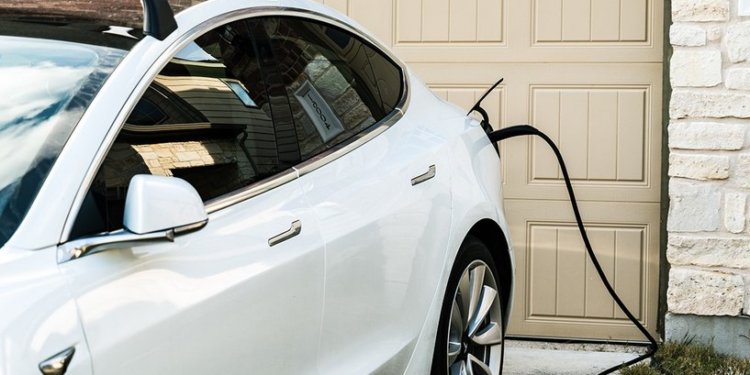James Titcomb, writing in the Telegraph, has spotted a hugely regressive factor involving electric cars. And the faster the Government pushes us towards EVs, the more drastic the consequences. The problem is the driveway divide which he discovered after buying his own EV:
I have an advantage in the electric transition: the humble driveway. Unlike almost half of the country who live in terraced housing or flats, my dwelling has a dedicated parking spot where I have been able to install a wall-mounted charger.
In a petrol-powered world, the driveway divide did not matter. Whatever one’s domestic circumstances, we all had to queue up at the forecourt and pump fuel into our vehicle every few hundred miles. In the electric age, meanwhile, driveway ownership divides motorists into haves and have-nots.
There are obvious convenience benefits to being able to charge up domestically. Leaving the house with the equivalent of a full tank every day and never having to visit a petrol station easily outweighs the moderate inconvenience of charging on the occasional longer journeys.
But the main advantage of charging from one’s own house is financial. On today’s smart overnight tariff, charging a battery from empty to full costs less than a fiver. In comparison, filling up an average family petrol car costs £75, according to the RAC Foundation. A full tank will go further than a charged battery, but the difference is still huge on a per-mile basis: around £2 to drive 100 miles in the EV, compared to £14 for petrol.
This has always been the promise of electric cars, even for those unconvinced by the environmental factor: while the car’s sticker price may be higher, you will save on running costs in the long-run.
That calculation, however, has completely broken down for those who are unable to plug in at home. While the rise of smart meters and EV-only energy tariffs mean charging at home costs almost nothing, soaring electricity prices have led the price of public charging to hit an all-time high.
Powering up at an ultra-rapid station costs the equivalent of £28 for 100 miles – almost double that of a petrol car – and this has risen significantly in the last two years. Slower chargers, such as those placed in lampposts by councils, are slightly cheaper, but not by enough to make EVs financially viable. Supermarkets and other shops that once offered free charging as a way to get people in the door have stopped doing so.
When electric cars are both more expensive to buy and more expensive to run, owning them makes little sense. No wonder, then, that the EV-owning class is disproportionately those with dedicated parking – 93% of people who have given up their petrol-powered vehicle have a home charger.
When those without a driveway – estimated at up to 40% of the population – have no financial incentive to own an electric car, it should not be a surprise that ownership is so far behind official targets.
Something Titcomb doesn’t mention is the prospect of a whole new type of protocol also. EV owners who’ve driven a long way will turn at up relatives’ or friends’ houses expecting to plug in on arrival, rather than filling up at a local petrol station, won’t they? Adult children rolling up for the weekend will do the same. It’d be as if in the old days the host was expected to have half a dozen cans of petrol waiting in the porch.
This means well-heeled homeowners with offroad parking and plug-in facilities, despite being rinsed for free volts by their guests, can offer electrical hospitality. After all, you could hardly send your guests off to pay vastly more at a commercial charger, could you? Meanwhile, those without drives will have no choice but to send Uncle Jack and Auntie Nancy off to some rip-off plug-in facility at a nearby shopping centre. Unless of course they’ve had the good sense to hang on to their petrol car.
It’s another way EV cars and the mandates could divide Britain even more than it already is. And, big surprise, now it’s a Labour Government doing everything it can to accelerate the imbalance.
Titcomb concludes:
One way or another, the pavement tax will need addressing before the majority of the population is forced on to EVs. If not, electric car mandates will become even more unpopular than they are now.
Worth reading in full.
Stop Press: Britain will become a “laughing stock” unless hybrid cars are banned from 2030, Net Zero lobbyists have said. According to Electric Vehicles U.K. (EVUK), allowing some hybrid cars to remain on sale after 2030 would be a “catastrophic misstep” and hold back the rise of EVs. It comes after the Government pledged to bring forward the ban on the sale of new petrol and diesel cars from 2035 to 2030 but made an exception for certain hybrid vehicles to remain on sale.












To join in with the discussion please make a donation to The Daily Sceptic.
Profanity and abuse will be removed and may lead to a permanent ban.
Let’s wait for the “reporting restrictions” on a certain couple of trials starting (or at least planned to) in the next few weeks… Will we even find out details after the case?
In the event of (in my opinion very possible) run on the pound will that be “misinformation” and prohibited?
If we ever manage to get rid of this wholly anti British so-called government vengeance must be wrecked. For all members of the Cabinet, serving and ex the sentence must be life. For Kneel and his clique something worse as befits traitors.
Leftism is like a cancer and we all know the best way of dealing with that.
But… it’s not just Starmer. There are plenty of sanctimonious pecksniffs that would jump on the opportunity to demonstrate their self-righteousness with allegations of harassment.
Starmer should take care… there will be plenty of people willing to take on even Labour luminaries for a careless remark.
Finally, Home Secretary Yvette Cooper has said she wants to lower the threshold for the recording of ‘non-crime hate incidents’ (NCHIs)
Tories are the same. Have the same policies.
Thinking will be a crime.
Oh wait, it already is, if you think, or say a silent prayer outside the baby-murder clinic. One of the icons of ‘health care’ and beloved by all.
PC Fascism. All part of the plan.
It can and will.
There are more of us than them and they’re terrified we might understand that fact.
The wokusts have to abolish free-speech because reality refuses to conform to their deranged fantasies. But our problem is not only the formal abolition of free-speech which our anti-white government is carrying out – just as dangerous is the anti-white government’s imposition of Orwellian lies. For example:
Anti-whitism is called “anti-racism”
Conformity to the anti-white agenda is called “diversity”
Exclusion of truth-tellers is called “inclusion”
These lies are framed within the wokusts’ over-arching lie of “equality” – which is a thing that simply doesn’t exist.
For a moment I thought you were reading the Kings Speech!
https://m.youtube.com/watch?v=2KyAUSqqmZY
Nigel Farage’s New Year message filmed at Blenheim Palace. Calm, considered, thoughtful.
Nice place that, went there as a youth.
I wonder if the current Duke of Marlborough was aware that Nigel would be recording his NY message there?
Depends if he was in the public part of the building i suppose.
Thinking about the banter police business in pubs.
Yes some places may become dystopia but only the places you wouldn’t normally go anyway, like airports and chain hotels.
In most decent pubs I suspect the reaction would simply be not to employ the kind of woke twats that could be offended.
“Pubs will have to employ ‘banter bouncers’ to police the conversations of customers to make sure no one is saying anything risqué that could be overheard by a member of staff.”
They really are tying to create a Stasi 2.0 but I would like to see how that works in reality, not that I go to pubs much these days but this can include any public place.
I doubt they can afford them after the Rachel from Accounts budget.
The way to get around this is to defy all of the above. Keep saying are you blind etc and see if they can control our speech.
“ The answer is that Labour wants to criminalise parents and health professionals who deviate in any way from the ‘gender-affirming care’ approach,”
You mean deviate to the Cass Report, that long awaited report, a bit like that Danish study on masks in 2020 that the media didn’t shut up about, until that is the report came out that went against their narrative. After that, radio silence as if they just all forgot to report on its findings. Very convenient.
‘all reasonable steps’
Define reasonable. Defining things is not the forte of the Student Union government. Women? Pass. Working People? Pass.
Never mind, we’ll loath him and his party even more.
https://www.conservativewoman.co.uk/nigel-farage-addresses-the-nation-from-blenheim-palace/
A short precis of Nigel Farage’s New Year speech from Blenheim Palance. The full film of the speech is embedded.
Strong, polite, thoughtful and considered.
“Let’s make Britain Great Again.”
“Pubs will have to employ ‘banter bouncers’ to police the conversations of customers to make sure no one is saying anything risqué that could be overheard by a member of staff….”
The problem here is that the bouncers will also be employees of someone so should also be protected by bouncers who should also be ………..!